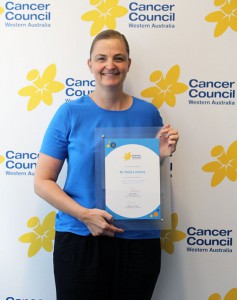Investigating the body’s natural immune response to mesothelioma
 Investigating the body’s natural immune response to mesothelioma
Investigating the body’s natural immune response to mesothelioma
Dr Sally Lansley, a researcher within our Pleural Medicine Unit has recently won a Cancer Council WA grant to investigate the effect of fibroblast growth factor 9 on the body’s natural immune response to mesothelioma.
Malignant mesothelioma is an aggressive cancer that kills one person every 12 hours in Australia and is a disease in which cancer cells form in the lining of the chest or abdomen.
Australia has one of the world’s highest rates of mesothelioma due to the mining and exportation of blue asbestos (crocidolite). Crocidolite has thin fibers and when airborne, these fibers can be inhaled easily and become lodged in the lining of the lungs, more than other forms of asbestos forms.
Dr Lansley and the Pleural Medicine team discovered that a factor produced by malignant mesothelioma tumours, fibroblast growth factor 9 (FGF9), reduces the body’s natural anti-tumour response.
While anti-FGF9 drugs can reduce tumour size, once treatment ends the tumour often returns.
As Chief Investigator, Dr Lansley will examine how FGF9 affects the immune system to improve the effectiveness of anti-FGF9 treatment. This research could lead to the development of a new, more effective, treatment for people with living with mesothelioma.
